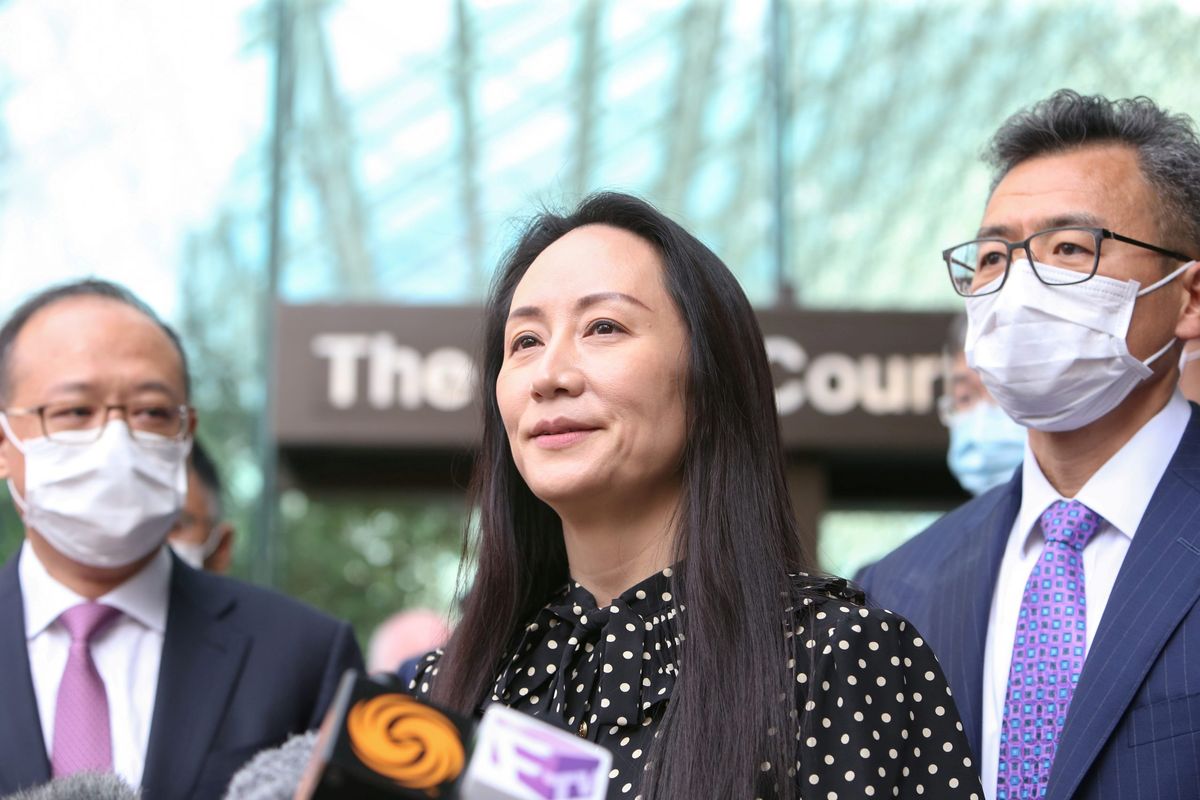US-China relations eased as Huawei’s Meng and the “two Michaels” return home

A few minutes every morning is all you need.
Stay up to date on the world's Headlines and Human Stories. It's fun, it's factual, it's fluff-free.
There had reportedly been previous negotiations to let her go, but a resolution hadn’t been met. When the Biden administration came in though, those negotiations were restarted, and they eventually reached a deal to let Meng go back to China.
What’s the case with the Huawei CFO?
- Her name is Meng Wanzhao, and her dad is the founder of Huawei, so she’s like royalty within China’s telecommunications sector.
- She was arrested in December of 2018 by Canadian authorities while she was transferring flights in Vancouver at the request of the United States.
- According to prosecutors, she was arrested because she lied to bank officials when asked about whether Huawei had business dealings with Iran, knowing that US sanctions on Tehran would mean that the bank wouldn’t finance the sale.
- This fraud case was amid a lot more, though.
- Huawei’s rise had become a symbol of China’s growing influence worldwide, and the Trump administration was pretty overt about its efforts to stifle the company in the US.
- There had reportedly been previous negotiations to let her go, but a resolution hadn’t been met. When the Biden administration came in though, those negotiations were restarted, and they eventually reached a deal to let Meng go back to China.
What was the deal?
- The exact details of the negotiations haven’t been released yet, but this is what we know.
- For Meng, her release was predicated on her admitting that she had committed several things that she had been accused of.
- Her release was soon followed by the the release of two Canadians, Michael Kovrig and Michael Spavor, who had been detained in China.
- “The two Michaels,” as the pair eventually were called, were arrested in China in 2018 under accusations of espionage. Spavor was sentenced to 11 years in prison under spying charges, while Kovrig was still awaiting trial.
- While the Chinese foreign ministry hasn’t yet commented on the release of Kovrig and Spavor, on Sunday, The Global Times said that Kovrig and Spavor “confessed their guilt for the crimes they committed in China and were released on bail for medical reasons before they departed China."
What’s the US and Canada saying about all of this?
- Canadian Prime Minister Justin Trudeau sent a message of relief during his announcement of the ordeal.
- In response to a question from a reporter, he said, “ … the fact of the matter is, I know Canadians will be incredibly happy to know right now, this Friday night, Michael Kovrig and Michael Spavor are on a plane and they’re coming home.”
- The US sent a similar message but with a slightly harsher tone, welcoming the decision to release the two Canadians in a press release from the State Department but calling their detentions “arbitrary.”
- “We are pleased that they are returning home to Canada,” read the press release.
- But many in the US and Canada accused China of “hostage diplomacy,” throughout the process.
What was China’s response?
- In a statement made by a Chinese foreign ministry spokesperson, China praised the efforts to return Meng home.
- In response to questions, the spokesperson echoed the comments made by the US, calling Meng’s arrest in Canada “ … typical arbitrary detention.”
- The spokesperson called the allegations fraudulent and repeatedly said that Meng was innocent.
- Chinese state media rejected the idea that Meng was guilty, saying that the deal with the US required her to make “untrue statements about Huawei’s business in Iran.”
- China has also denied any claims of “hostage diplomacy."
What’s next?
- This move alleviates some of the strain the US-China relationship has taken in recent months. And moving forward, there will be some key things people will be watching.
- First, it remains to be seen if this kind of diplomacy, which involves arresting foreign nationals and then negotiating for their release, will be used on any real scale in China or the US.
- Second, it also remains to be seen whether the resolution marks a change in the Biden administration’s attitude toward China, which so far has been relatively hard-line. With this, it could also indicate that the US is a little more open to trying to reconcile with China, even thorugh smaller diplomatic avenues.
You drive the stories at TMS. DM us which headline you want us to explain, or email us at tips@themilsource.com







Comments ()